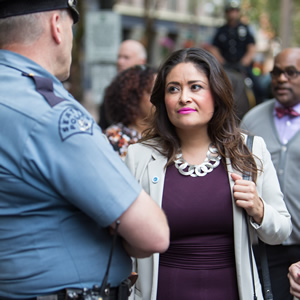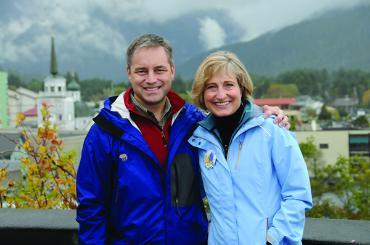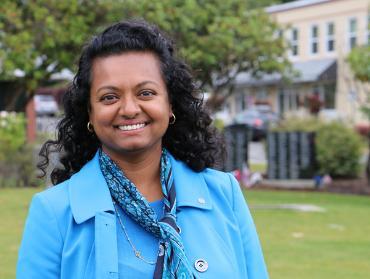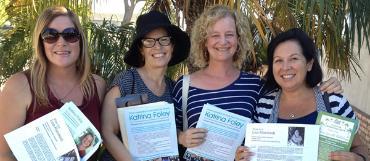This story originally appeared in Lawyer, Fall 2016.
Let's say you're a lawyer whose client isn't just one person. It's an entire state, or every kid in your school district, or every person in your city. Your clients need you on evenings, weekends, holidays. The hours aren't exactly billable, but the payoff is priceless.
Many Seattle University School of Law alumni have found their calling on the campaign trail. Elected office can be a natural progression of passionate advocacy, a pull to leadership, or a desire to serve others. Often, it's all of the above.
Aside from the judiciary, which may or may not be an elected position depending on the state and the court, a law degree isn't required for most public office. But law school alumni say it's a tremendous benefit - whether in drafting new laws, working on tricky labor relations issues, or responding to concerns from constituents.
"Everything I do, and I mean every single thing, I'm using the skills I learned in law school," said Seattle City Councilmember M. Lorena González '05. "The notes I take, the questions I ask, knowing there are two sides to every issue and sometimes more than two sides."
A recent study by the Center on the Legal Profession at Harvard Law School found that the number of lawyers in the U.S. Congress has declined from 80 percent in the mid-19th Century to 60 percent in the 1960s to 40 percent today. Four of the last 10 presidents have been lawyers.
The study's author, Nick Robinson, wrote that this decline "will undoubtedly impact the profession's public and self-identity, which has long been intertwined with elected office and political leadership." It's an identity that traces as far back as Independence; French diplomat Alexis de Tocqueville famously observed in the early 1800s that in American culture, lawyers "form the highest political class, and the most cultivated circle of society."
But for law school alumni, election to public office isn't about being a member of the elite. It's an honor they accept with humility and dedication to the people they serve.
 M. Lorena González '05
M. Lorena González '05
Seattle City Council
M. Lorena González grew up in Grandview, Washington, the daughter of immigrant parents from Mexico who worked the fields of the Lower Yakima Valley. She remembers earning her first paycheck at the age of 8, picking cherries before school. In 2015, she became the first person of Latino/a descent elected to the Seattle City Council. In that same election, Debora Juarez '87 became the first Native American on the council.
"The only lawyers I knew were the ones on TV," González said.
Running for elected office wasn't in her game plan. She was driven to complete her education and saw law school as a way to fight for people like her parents, people who had no voice or power in the system. "I always planned to become a lawyer and practice law my entire career," she said. "Plans change."
As a plaintiff's attorney at Schroeter Goldmark & Bender, she quickly developed a national reputation as a fierce champion of civil rights. In 2012 she brought a federal case against the city of Seattle for police brutality and won. She was offered an opportunity to serve as Mayor Ed Murray's legal counsel in 2014 and then recruited to run for one of two newly created citywide council positions.
"I'm not your typical politician," she said. "I come from a lived experience of disempowerment and I've always been an advocate for the disenfranchised. I did that in my law practice and now I do it as an elected official. When several people suggested to me that I run for office, it seemed like a natural next step for my activism."
Just four months after her historic election, González was in the national news again. When she and the council's four other female members voted against a street vacation that would have allowed development of a basketball arena, they faced misogynistic, racist threats and online attacks from incensed sports fans. To this day, she still gets backlash from that vote.
Mentors and friends from law school supported her during that frightening time, just as they supported her during the campaign. "I have a core group of friends from law school that I call my law-laws," she said. "They're not just friends; they're family. They've been pivotal in my being able to succeed."
 Gov. Sean Parnell '87
Gov. Sean Parnell '87
Governor of Alaska, 2009-2014
Throughout his undergraduate studies at Pacific Lutheran University, as well as law school, Sean Parnell '87 had a singular focus - Alaska. A resident of Anchorage since the age of 10, he couldn't wait to get back. In fact, he specifically chose Seattle University School of Law (then University of Puget Sound) because Alaska Sen. Ted Stevens told him there would be more Alaskans there.
It was this dedication to his northern homeland, and the value of public service instilled in him by his parents, that fueled his interest in politics. After several years of practicing law, Parnell launched his political career and was elected to the state's House of Representatives in 1992. In 2009, three years after his subsequent election as lieutenant governor, he suddenly found himself in the governor's chair when Gov. Sarah Palin resigned to join presidential candidate John McCain as his running mate.
Parnell, the first law school alum to govern a state, said his legal education and career as a lawyer were instrumental to his service as an elected official. "It goes back to my legal writing class in the first year of law school," he said. "You learn how to identify the issue, marshal the facts, apply the facts, and make a logical argument based on those facts."
He said you also learn very quickly how to overcome a fear of public speaking. "In 18 years of public service, I've had to walk into hundreds of rooms filled with people and address them, sometimes on the fly," he said. "Having that training in organizing my thoughts has been extremely useful."
In 2014, Parnell was unseated by another law school alumnus, Bill Walker '83. He now operates a private law firm in Palmer, Alaska, concentrating on business law and real estate. Looking back on his years as governor, he's proud to have created economic opportunities for his beloved state and increased awareness of domestic violence through legislation and the annual Choose Respect rallies that he and his wife, Sandy, led.
He's philosophical about advising the next generation of potential politicians.
"I would tell current law students not to serve until you can say with all of your heart that you want to do this for others. It's too easy to act in your own self-interest," he said. "If your motivations are good, then your actions will be for the right reasons."
 Vini Samuel '97
Vini Samuel '97
Mayor of Montesano
Walking the quiet streets of downtown Montesano, Vini Samuel '97 waves to at least half a dozen people. Others roll down their car windows to chat with her. She worries over the dandelions poking through the grass on city property or a sidewalk in need of repair.
"This town is like Mayberry," she said. "That's what people love about it."
For Samuel, the small-town charm of Montesano - or Monte, as she and other locals call it - isn't just something she enjoys as a resident. She's the town's mayor, so she also feels it's something she has the responsibility to preserve.
Born in Kerala, India and raised in Juneau, Alaska, Samuel and her husband chose this 4,000-person city on the Olympic Peninsula for its reasonable commute to Olympia, where her husband works, and its similarity to Juneau. Samuel settled in to practice family law, kept active in the Democratic Party, and served as a delegate for President Barack Obama in 2008.
She had served on the city council around a decade ago but recently became increasingly concerned about the future of the city. "The former mayor was taking the city in a direction I couldn't support. I didn't expect to run again for elected office but the situation got worse and worse," she said. "We love this town and sometimes it's either step up or watch what you love get destroyed."
In 2015 she was elected as the town's first female mayor, and the first Indian-American woman to serve as mayor of a U.S. city.
Like González, Samuel still relies on her law school classmates for support. She vacations with Section B friends every summer. And while she agrees that legal education helps politicians think logically, ask the right questions, and analyze problems, she said it also burdens lawyers with an added dose of responsibility.
"Any lawyer who isn't active in their community is not doing their duty to their profession," she said. "It goes beyond pro bono work. Attorneys contribute to the foundational fabric of communities."
 Katrina Foley '96
Katrina Foley '96
Costa Mesa City Council
When Katrina Foley '96 rejoined the Costa Mesa City Council in 2014, her experience as a lawyer came into play almost immediately.
A pending lawsuit against the city by its employees had already racked up $1 million in legal fees and showed no signs of ending. "I'm an employment law attorney, so the first thing I did was get council to agree to mediation," she said. "We successfully resolved the case within a few months, and it had been pending for years."
Foley has long held elected office in this Orange County, California suburb. She first served on the city council from 2004 to 2010, was recruited to run for the school board, and served there for the next four years before returning to the city council.
In her mind there's no doubt that her legal education and her experience as a litigator helped her, not only while in office but also while campaigning. "You're not afraid to put yourself in that vulnerable position of having to ask for things - asking for votes, asking for money," she said. "When you're in court, you're asking for what you want all the time."
Foley always intended to be a lawyer. "It's right there in my high school yearbook," she said. And she still is. She owns a boutique employment law and business litigation law firm, The Foley Group, PLC, in Newport Beach.
But the draw to politics was also strong. While an undergraduate at University of California, Los Angeles, she edited the campus women's magazine at a crucial point in history - 1992, also known as the Year of the Woman, when several women were elected to the nearly all-male U.S. Senate, including Barbara Boxer and Dianne Feinstein from California.
As a law student, she helped lead the Women's Law Caucus. As an elected official, she's worked for family-friendly neighborhoods, parks, increased school performance, and better labor relations.
"Elected officials are usually implementing, changing, or creating laws," she said. "It just seems natural you'd be a lawyer."
